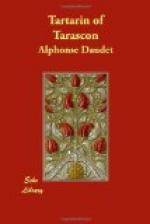In ballad-singing, as in cap-popping, Tartarin was still the foremost. His superiority over his fellow-townsmen consisted in his not having any one song of his own, but in knowing the lot, the whole, mind you! But — there’s a but — it was the devil’s own work to get him to sing them.
Surfeited early in life with his drawing-room successes, our hero preferred by far burying himself in his hunting story-books, or spending the evening at the club, to making a personal exhibition before a Nimes piano between a pair of home-made candles. These musical parades seemed beneath him. Nevertheless, at whiles, when there was a harmonic party at Bezuquet’s, he would drop into the chemist’s shop, as if by chance, and, after a deal of pressure, consent to do the grand duo in Robert le Diable with old Madame Bezuquet. Whoso never heard that never heard anything! For my part, even if I lived a hundred years, I should always see the mighty Tartarin solemnly stepping up to the piano, setting his arms akimbo, working up his tragic mien, and, beneath the green reflection from the show-bottles in the window, trying to give his pleasant visage the fierce and satanic expression of Robert the Devil. Hardly would he fall into position before the whole audience would be shuddering with the foreboding that something uncommon was at hand. After a hush, old Madame Bezuquet would commence to her own accompaniment:
“Robert, my love is thine!
To thee I my faith did plight,
Thou seest my affright, —
Mercy for thine own sake,
And mercy for mine!”
In an undertone she would add: “Now, then, Tartarin!” Whereupon Tartarin of Tarascon, with crooked arms, clenched fists, and quivering nostrils, would roar three times in a formidable voice, rolling like a thunderclap in the bowels of the instrument:
“No! no! no!” which, like the thorough southerner he was, he pronounced nasally as “Naw! naw! naw!” Then would old Madame Bezuquet again sing:
“Mercy for thine own sake,
And mercy for mine!”
“Naw! naw! naw!” bellowed Tartarin at his loudest, and there the gem ended.
Not long, you see; but it was so handsomely voiced forth, so clearly gesticulated, and so diabolical, that a tremor of terror overran the chemist’s shop, and the “Naw! naw! naw!” would be encored several times running.
Upon this Tartarin would sponge his brow, smile on the ladies, wink to the sterner sex, and withdraw upon his triumph to go remark at the club with a trifling, offhand air:
“I have just come from the Bezuquets’, where I was forced to sing ’em the duo from Robert le Diable.”
The cream of the joke was that he really believed it!
Chiefly to the account of these diverse talents did Tartarin owe his lofty position in the town of Tarascon. Talking of captivating, though, this deuce of a fellow knew how to ensnare everybody. Why, the army, at Tarascon, was for Tartarin. The brave commandant, Bravida, honorary captain retired — in the Military Clothing Factory Department — called him a game fellow; and you may well admit that the warrior knew all about game fellows, he played such a capital knife and fork on game of all kinds.




